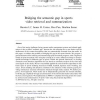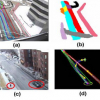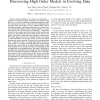813 search results - page 39 / 163 » Learning semantic models from event logs |
EMNLP
2009
14 years 9 months ago
2009
The work presented in this paper explores a supervised method for learning a probabilistic model of a lexicon of VerbNet classes. We intend for the probabilistic model to provide ...
118
click to vote
SPIESR
2003
15 years 16 days ago
2003
One of the major challenges facing current media management systems and related applications is the so-called ‘‘semantic gap’’ between the rich meaning that a user desires...
CAISE
2005
Springer
15 years 4 months ago
2005
Springer
Abstract. Modern process-aware information systems store detailed information about processes as they are being executed. This kind of information can be used for very different p...
128
click to vote
CVPR
2009
IEEE
16 years 6 months ago
2009
IEEE
The visual surveillance task is to monitor the activity of objects in a scene. In far-field settings (i.e., wide outdoor areas), the majority of visible activities are objects movi...
183
Voted
ICDE
2008
IEEE
16 years 16 days ago
2008
IEEE
Abstract-- Many applications are driven by evolving data -patterns in web traffic, program execution traces, network event logs, etc., are often non-stationary. Building prediction...



